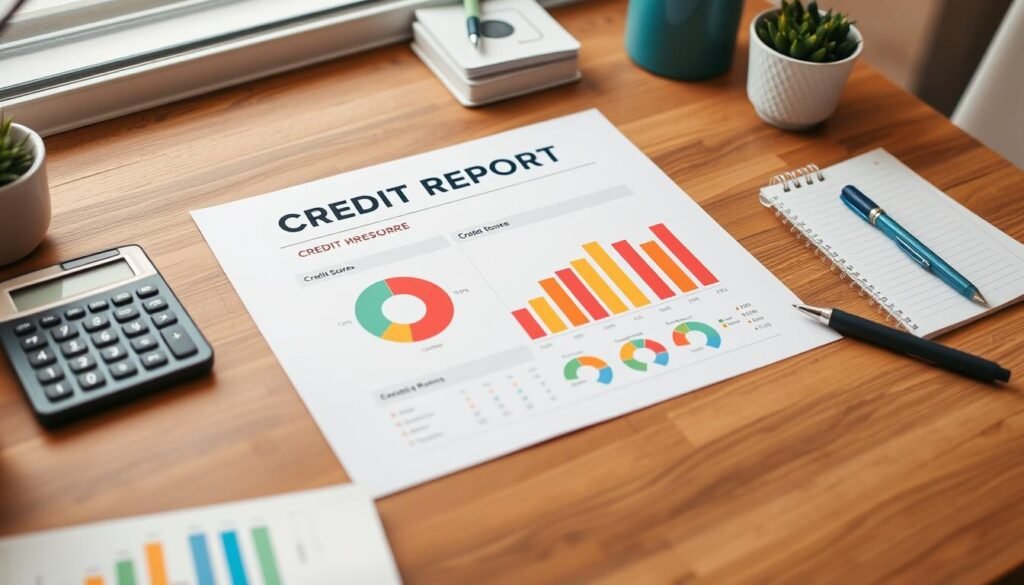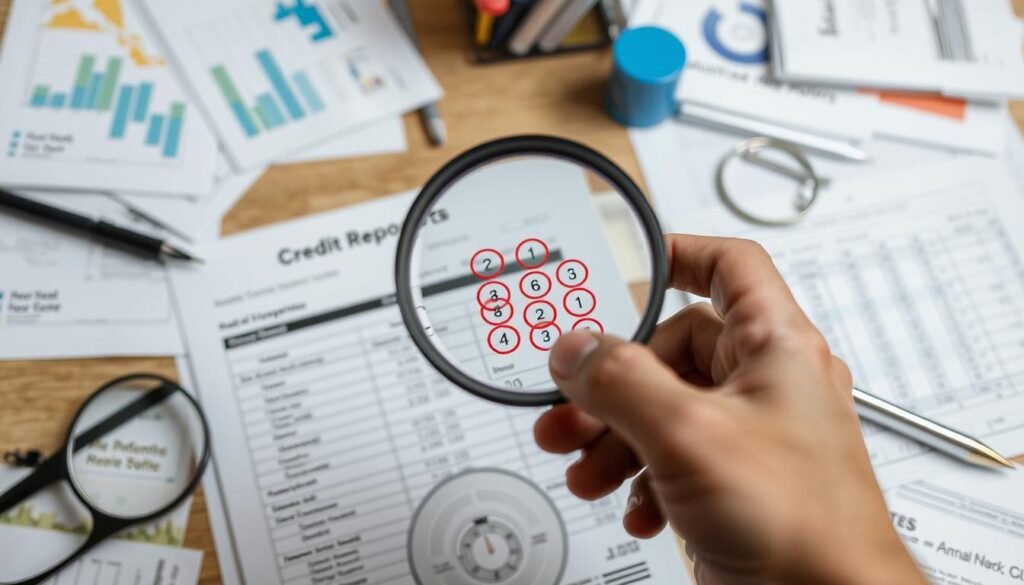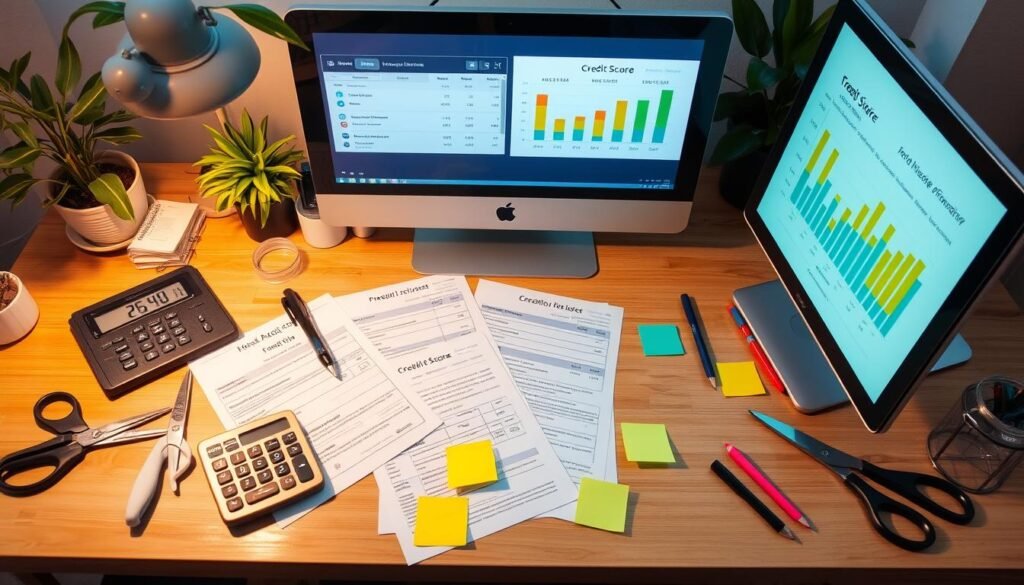Have you been denied a credit card or a loan? Finding errors on your credit report might be the reason. Millions in America go through this, feeling stuck about their finances. But you can change that. Imagine fixing your credit yourself, using strategies that actually work.
Starting your DIY credit repair journey can change everything. Think about this: Dovly users see their scores go up by 82 points on average. They’ve increased their scores by more than 9 million points! By using the right credit repair methods, you can see success too. This can lead you to financial freedom and stability.
This guide will show you how to better your credit score. It’ll help you correct mistakes and manage your money better. No matter if you’re new to finances or have been managing them for a while, our do-it-yourself credit fix tips will give you the tools and confidence to improve your credit score.
Table of Contents
ToggleKey Takeaways
- Understanding and regularly monitoring your credit score is crucial.
- Identifying and disputing inaccuracies can significantly boost your credit rating.
- Practical strategies like setting up automatic payments ensure timely bill payments.
- DIY credit repair techniques such as the Snowball Method streamline debt repayment.
- Reducing your overall debt and managing credit utilization substantially impacts your credit score.
Understanding Your Credit Score and Reports
Managing your credit starts with understanding scores and reports. This knowledge is key for DIY credit repair. It helps anyone starting their credit journey.
The Basics of Credit Scores
Credit scores show how likely you are to repay loans. They range from 300 to 850. Scores like the FICO® Scores are widely used by lenders. Your score comes from payment history, how much credit you use, and other factors.
Keeping your credit report up-to-date is crucial. It affects your score and financial health.

How to Obtain Your Credit Reports for Free
By law, you can get a free credit report every year from three bureaus: Equifax, TransUnion, and Experian. Until 2026, Equifax offers six extra free reports annually. You’ll need your personal info ready to get these reports.
Websites like Credit Karma and AnnualCreditReport.com make it easy. They help you understand how your financial behavior affects your score.
Importance of Regular Credit Monitoring
Credit monitoring means keeping an eye on your reports to catch issues early. After a data breach, many companies offer free monitoring. This adds security.
By checking your reports often, you catch mistakes or fraud fast. This keeps your credit good and helps it get better. Credit monitoring is essential for top-notch financial health.
Disputing Inaccuracies on Your Credit Report
Starting your journey to a better credit history means disputing errors on your credit report. You might be surprised to learn that nearly 20% of consumers find mistakes on their reports. Fixing these errors can boost your credit score and improve your financial health.

Identifying Common Credit Report Errors
Check your credit reports for errors like outdated personal information or wrong account statuses. These mistakes can hurt your credit score. It’s important to check your reports from Experian, Equifax, and TransUnion.
Steps to Dispute Errors with Credit Bureaus
After finding inaccuracies, you should start the credit bureaus dispute process. Follow these steps:
- Gather documents like account statements to support your dispute.
- Submit your dispute online, by mail, or phone to the credit bureau.
- When mailing, use certified mail to track your documentation.
- By law, credit bureaus must investigate your dispute within 30 days. Keep a copy of your dispute confirmation.
Follow-Up on Disputes
Following up on disputes is crucial. Often, the first attempt won’t resolve the issue. Recent data shows that only 24% of consumers see their disputes resolved initially. Keep an eye on your reports for updates and accuracy.
If successful, the bureau will correct the errors and update your report. You can have the bureau send the corrected report to those who requested it within the past 6 months or 2 years for job purposes. This ensures your credit is correctly shown to lenders or employers.
By watching your credit reports and addressing issues quickly, you can keep a healthy credit score. Taking action to dispute errors on your credit report can greatly help your financial well-being and might increase your credit score.
Strategies to Improve Your Payment History
Making payments on time is key since it makes up about 35% of your credit score. On-time payments improve your creditworthiness. This opens the door to better financial chances.

Setting Up Automatic Payments
Automatic payments setup helps you not miss deadlines. By setting up your bills to pay themselves, you’re always on time. This avoids late fees and helps your credit score.
Creating a Budget to Ensure Timely Payments
It’s vital to have a detailed budget. A good budget lets you prioritize expenses, ensuring you have money for bills. This way, you manage money better and keep improving your payment history.
Importance of Consistency in Payments
Consistency in payments is crucial for a positive history. Paying on time proves you’re reliable to those you owe. Late payments hurt your credit score for up to seven years. Stay consistent to improve your financial standing.
| Key Action | Benefit |
|---|---|
| Automatic Payments Setup | Prevents missed payments and late fees |
| Creating a Budget | Ensures bills are paid on time with allocated funds |
| Consistency in Payments | Enhances credit score by demonstrating reliability |
Use these strategies to better your payment history and credit profile. Being consistent and reliable with your finances is crucial. For more advice, visit The Dollar Navigator.
DIY Credit Repair Techniques
Raising your credit score may seem tough, but DIY credit repair steps can help. Begin by learning about strategies like the snowball method and thinking about debt consolidation. It’s also crucial to keep a good mix of credit types to show you can handle different debts.
The Snowball Method
The snowball method focuses on clearing your smallest debts first. This method helps you gain momentum as you go, making it simpler to deal with bigger debts. For those who like seeing regular progress, this strategy is really encouraging.
Debt Consolidation Strategies
With debt consolidation, you merge several debts into one loan that has a lower interest rate. This makes your payments simpler and can lower your total debt. Being smart with consolidated debt helps you avoid new credit issues and keeps you on your repayment plan.
Maintaining a Healthy Credit Mix
Having a healthy credit mix shows you’re good with different credit types, like credit cards and loans. This mix makes up about 10% of your FICO score. Lenders see it as proof you can handle various financial responsibilities. Managing this mix well, along with your credit use and payments, is vital for a strong credit score.
By applying these DIY credit repair strategies, you can boost your financial well-being. For deeper insights on fixing your credit yourself, visit this detailed guide.
Managing and Reducing Debt
To tackle debt well, you have to be proactive. First, know your credit utilization and take steps to manage your debt in a planned way. It’s key to stay informed about your financial status and set clear payoff goals for success over time.
Calculating and Reducing Your Credit Utilization
Your credit utilization is about how much of your credit limit you’re using. It’s best to keep this under 30% to keep a good credit score. Let’s say Beth has a $3,500 balance on her credit card. She got her interest rate cut from 22.5% to 9.99%. Now, she pays around $26.25 in interest each month. By keeping track of her spending and lowering her balance, she can reduce her credit utilization rate.
Setting Payoff Goals
Managing debt well also means setting clear, reachable payoff goals. Most debt plans take 3-5 years. For example, Beth wants to pay off $12,000 in 60 monthly payments. This helps her see her progress and stay on course. Adjust your budget to put more towards paying off debt. This could mean making extra payments or paying off high-interest loans first. This planned approach helps relieve financial stress and boosts your credit score too.
Here is a comparative snapshot illustrating Beth’s debt payment scenario:
| Debt Amount | Interest Rate | Monthly Interest Payment | Total Monthly Payment | Payoff Duration |
|---|---|---|---|---|
| $3,500 | 9.99% | $26.25 | $84.58 | 60 months |
| $12,000 | Average 9.99% | Varies | Varies | 60 months |
By working on reducing credit utilization and setting payoff goals, you can gain control over your money and plan for a successful future. For more tips on handling debt, check out this detailed guide to credit repair.
Avoiding New Credit Applications
To keep your credit score healthy, be careful about applying for new credit. It’s important not to ask for new credit cards or loans unless necessary. Too many new accounts can damage your credit. Let’s look into why hard inquiries matter and how to use credit wisely.
Impact of Hard Inquiries
Applying for new credit means lenders will check your credit report. This check, known as a hard inquiry, might lower your score for a bit. Having many of these in a short time can look bad to lenders. It’s best to only apply when it’s really needed.
When to Consider Opening New Credit Accounts
Open new credit accounts if it fits your financial plans. For example, a mortgage or auto loan can improve your credit mix. But, think about how it affects your credit score. It’s key to use credit responsibly to keep or improve your credit health.
Maintaining Self-Discipline
Being disciplined is crucial for good credit management. Instead of getting more credit, improve what you already have. On-time payments and keeping balances low help. They avoid negative effects of hard inquiries and support responsible credit use.
Stay disciplined with these tips:
- Set financial goals and work towards them methodically.
- Avoid impulse purchases by thinking through the necessity of each purchase.
- Utilize budgeting apps or tools to track your expenses and payments.
- Stay informed about your credit score by regularly checking your credit reports.
Knowing the hard inquiries impact and practicing responsible credit use makes navigating credit easier. This ensures a solid financial future.
Conclusion
Taking charge of your credit by yourself is a big step. It not only fixes problems on your credit report but also builds a strong financial base for the future. By using these credit repair methods, you learn a lot about finances. This knowledge helps you manage your money better.
Doing it yourself means you can avoid the high fees charged by professional companies. You might save 50-80% of those costs. But, this requires your time and attention to detail. Trying to fix your credit alone can be tricky. A small mistake could lower your score by 10-20%.
There are tools to help you, like the free eBook from Dollar Navigator. This book gives you valuable advice and easy steps to follow. It shows that with the right information, you can make a positive change in your credit score. Start today to take control of your financial future. Use the advice given to boost your credit and your financial health.
FAQ
What are some simple DIY credit repair tips to get started?
Start by getting your free credit reports from the major bureaus. Check for mistakes and dispute them. It’s crucial to pay your bills on time, keep your debt low, and not apply for new credit often.
Why is regular credit monitoring important?
Regular credit monitoring helps you spot mistakes quickly. It lets you see how your credit score improves and guards against identity theft. This gives you a clear view of your financial health.
How can I obtain my credit reports for free?
You can get a free credit report yearly from Equifax, Experian, and TransUnion. Visit AnnualCreditReport.com for your copy.
What are common errors found on credit reports?
Common mistakes include wrong personal info, accounts not yours, open accounts labeled as closed, and wrong balances or limits. Finding and fixing these errors is key for DIY credit repair.
How do I dispute errors on my credit report?
To dispute an error, contact the credit bureau showing the mistake. Provide documentation that proves your point. The bureau will check and correct any errors found.
Why is it important to set up automatic payments?
Automatic payments make sure you never miss a payment due date. This improves your payment history and helps protect your credit score. Consistent payments are vital for a better score.
What is the Snowball Method?
The Snowball Method involves tackling your smallest debts first. You keep making minimum payments on bigger debts. As you clear each debt, use the money for the next smallest. This builds momentum and encourages you.
How do debt consolidation strategies help in DIY credit repair?
Debt consolidation means combining multiple debts into one with a single payment. It often lowers interest rates and makes payments easier to manage. This can help you pay off debt more efficiently.
What are the benefits of maintaining a healthy credit mix?
Having a mix of credit types, like loans and credit cards, shows you can handle various credit well. This good management boosts your credit score.
How can I reduce my credit utilization?
To lower your credit utilization, pay down balances, ask for higher credit limits, and avoid new card purchases. Aim to keep utilization under 30% for best results.
Why should I avoid new credit applications?
New credit applications can lead to hard inquiries, dropping your credit score temporarily. Fewer applications mean lenders see you as less desperate for credit, helping your score stay stable.
What impact do hard inquiries have on my credit score?
Hard inquiries might lower your credit score slightly and linger on your report for two years. Managing them helps keep your credit score healthier in the long term.
Why is it important to set payoff goals?
Setting payoff goals gives you direction and motivation to lessen debt. Clear goals keep you focused on bettering your financial health and credit.
What’s the importance of maintaining self-discipline during the credit repair process?
Self-discipline means sticking to your budget, paying on time, and avoiding unnecessary buys. It’s vital for making steady progress towards a better credit score and DIY credit repair success.
Source Links
- Beyond DIY Credit Repair Software: The New Way to Better Your Credit – https://www.dovly.com/diy-credit-repair-software/
- DIY: How to Repair Your Credit | 3 Tricks to Boost Your Score – https://wiseloan.com/blog/diy-credit-repair-tricks/
- Boost Your Credit Score With Advanced DIY Credit Repair Software – https://credit-diy.com/diy-credit-repair-software
- Understanding Credit Reports: How It Is Used | myFICO – https://www.myfico.com/credit-education/credit-reports
- Credit Repair: How to “Fix” Your Credit Yourself – Experian – https://www.experian.com/blogs/ask-experian/credit-education/improving-credit/credit-repair/
- Understanding Your Credit – https://consumer.ftc.gov/articles/understanding-your-credit
- Disputing Errors on Your Credit Reports – https://consumer.ftc.gov/articles/disputing-errors-your-credit-reports
- How to File a Dispute Items on Your Credit Report Online – https://consumerrecoverynetwork.com/dispute-tradeline-diy-credit-repair/
- How do I dispute an error on my credit report? | Consumer Financial Protection Bureau – https://www.consumerfinance.gov/ask-cfpb/how-do-i-dispute-an-error-on-my-credit-report-en-314/
- DIY Credit Repair: 4 Simple Ways to Improve Your Credit Score All by Yourself – https://www.eloan.com/blog/debt-management/diy-credit-repair-4-simple-ways-to-improve-your-credit-score-all-by-yourself
- 7 effective DIY credit repair tips – https://www.creditrepair.com/blog/credit-repair/diy-credit-repair/
- DIY Credit Repair: 11 Steps to Help Fix Your Credit – Self. – https://www.self.inc/blog/diy-credit-repair
- DIY Credit Repair 101: A Beginner’s Guide to Fixing Your Credit – https://financebuzz.com/diy-credit-repair
- The Do-It-Yourself Debt Management Program: A Template for Debt Relief – https://www.incharge.org/debt-relief/debt-management/debt-management-program-template-debt-relief/
- Ultimate Guide to Creating Your Own DIY Debt Management Plan | MMI – https://www.moneymanagement.org/budget-guides/create-a-diy-debt-repayment-program
- Does Free Do-It-Yourself Credit Repair Work? – https://www.debt.com/credit-repair/does-diy-credit-repair-work/
- Credit Repair Options, How They Work And How To Choose | Bankrate – https://www.bankrate.com/personal-finance/debt/types-of-credit-repair/
- 13 ways to fix your credit by yourself – https://www.creditrepair.com/blog/credit-repair/repair-your-credit-yourself/
- Exploring the Pros and Cons of DIY Credit Repair – https://creditnerds.com/exploring-the-pros-and-cons-of-diy-credit-repair/
- DIY Credit Repair: Strategies to Try and Tactics to Avoid – NFCC – National Foundation for Credit Counseling – https://www.nfcc.org/blog/diy-credit-repair-strategies-to-try-and-tactics-to-avoid/



